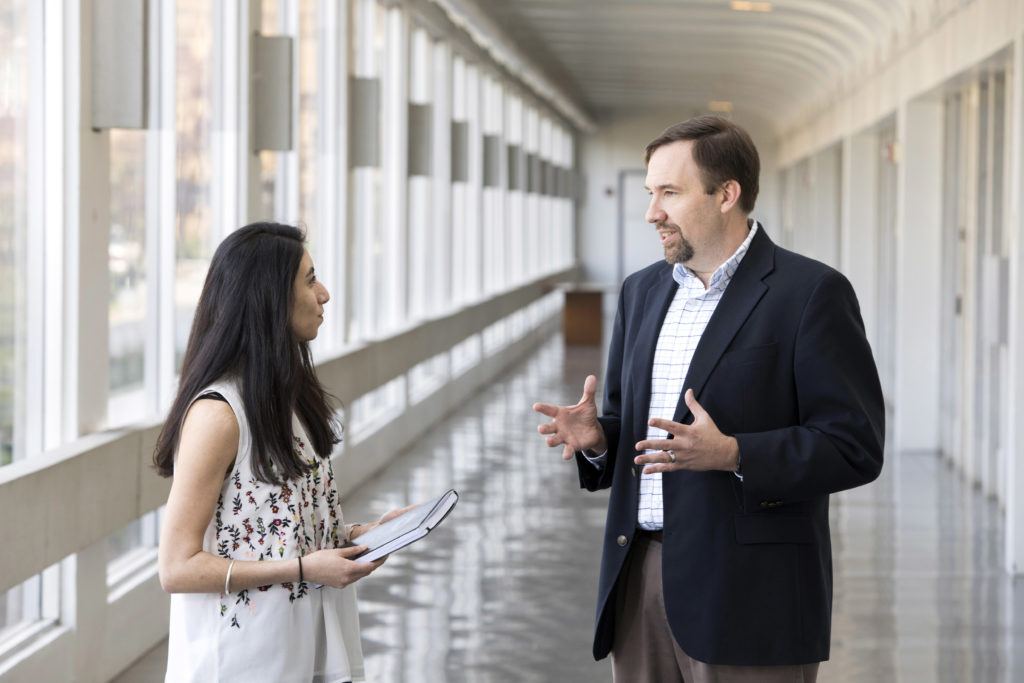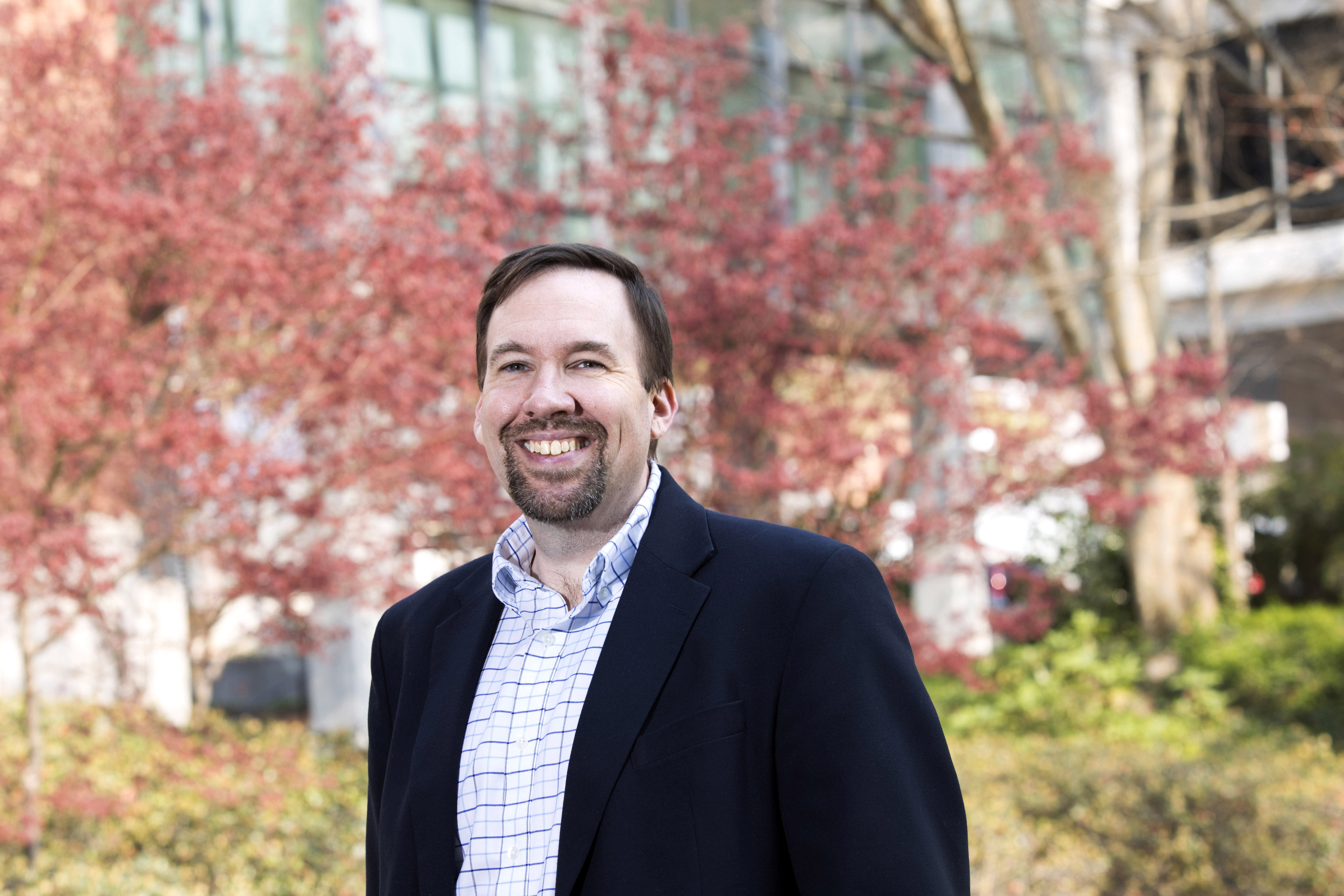Christopher Bland, clinical associate professor in the College of Pharmacy, educates students and conducts infectious diseases research that results in better treatment outcomes and fewer side effects for patients.
Where did you earn degrees and what are your current responsibilities at UGA?
I earned my Doctor of Pharmacy degree at the University of South Carolina in 2000. I am a clinical associate professor in the College of Pharmacy at our newest distance campus in Savannah. Currently all of our students spend their first two years of pharmacy school in Athens at the main campus, and then a good number of students spend their last two years at one of our distance campuses in Albany, Augusta or Savannah.
When did you come to UGA and what brought you here?
I spent nearly 15 years as a clinical hospital pharmacist in Augusta. During that time, I had significant interaction with the UGA Augusta campus, precepting many students and teaching as an adjunct faculty member within the infectious diseases and critical care portion of the curriculum. In 2015, I found out that the College of Pharmacy was opening a new campus in Savannah and that I could help launch the campus. I was increasingly beginning to enjoy research and teaching, so I looked into the opportunity further. After much deliberation and prayer, it was too good of an opportunity to pass up! It has been an outstanding experience.
What are your favorite courses and why?
My students would tell you that I think every course is my favorite one! If I had to pick my favorite, it likely would be our PHRM 4040 “Essentials IV” course in the second year of the curriculum. Pharmacy students are typically terrified about antibiotic therapy courses, as there are a number of factors that go into selecting an antibiotic, which leads to stress. Additionally, students have to orally present their answers to me. In this class I do my best to simplify how to select an antibiotic once the culture result returns. By the end of the class I believe they begin to understand why infectious diseases is fun to learn and also have more confidence in their ability to understand what goes into selecting an antibiotic for a patient.
What are some highlights of your career at UGA?
I was fortunate to be named the College of Pharmacy’s Teacher of the Year for 2017. We have so many outstanding teachers within our college that it was humbling to receive the honor.
How do you describe the scope and impact of your research or scholarship to people outside of your field?
We are facing a global health crisis with regards to infectious diseases and antibiotic therapy. Essentially, we have the “perfect storm” of more resistant bacteria, overprescribing of antibiotics for viruses (where they don’t work), and less and less pharmaceutical industry research for new antibiotics due to lack of financial gain. My research focuses on maximizing antibiotic stewardship, which is essentially maximizing clinical cure of patients that are infected in the least harmful way from a side effect and cost standpoint. I currently partner with a clinical pharmacist here in Savannah at St. Joseph’s/Candler Health System named Bruce Jones. He and I have focused our research specifically on penicillin allergies to help assess and perform skin testing on patients in an attempt to remove their allergy from their profile. We know from published data that nearly 90 percent of self-reported penicillin allergies by patients are found to be false upon questioning and/or confirmatory skin testing. Allergists are not available at many hospitals, including our own, so we work together with our nurses to perform this research. Additionally, our UGA students are very involved in the process by interviewing patients about their allergies to try and remove the allergy. By “de-labeling” these patients of their allergy, they get better treatment outcomes and fewer side effects by using a penicillin-type antibiotic.
How does your research or scholarship inspire your teaching, and vice versa?
My research is clinical in nature, meaning that the scope of our research focuses on treating the patient who has an infectious disease at the bedside. Pharmacists internationally are more and more integrated into the care of patients within a multidisciplinary approach with physicians, nurse practitioners, physician assistants, etc. A major advantage of working as a clinical pharmacist for nearly 15 years prior to coming to UGA is that I am able to bring those cases I saw in an academic interdisciplinary practice to the classroom, which resonates with students. Many of my students are co-investigators with me in different projects, which helps inspire them as well to further their knowledge base. Additionally, when students see that our research is being used across the country to help make treatment decisions, it inspires them to go the extra mile to study and work toward the ultimate goal of helping maximize antibiotic therapy in their patient.

What do you hope students gain from their classroom experience with you?
I hope they gain several things. First, I hope they gain my trust. If they trust me then they will go the extra mile to learn the material. Second, I hope they gain passion for learning. I do my best to exhibit passion for not only the material but for them as students. Third, I hope they gain respect for treating patients. One of the most important parts of my job is to instill that these are not merely “classroom cases” in a textbook, but represent actual patients that are someone’s family member or friend that require our expertise and care. Ultimately our students will transition from the classroom to the bedside, clinic or pharmacy, where they will be participating in patient care so making that connection is critical.
Describe your ideal student.
My ideal student is flexible, loves to be challenged and seeks to understand the “why” behind each answer. One of the reasons I took the position was that I knew UGA pharmacy students were some of the best in the country compared to other schools. This has been validated over and over again in my nearly four years at the college.
Favorite place to be/thing to do on campus is…
First and foremost to visit with my fellow faculty who are in Athens. Since I am on a distance campus, I love to catch up with my friends. Second of course is to eat some great food! Probably my favorite spots are Mama’s Boy and Clocked. Often the friends and food go well together!
Beyond the UGA campus, I like to…
… spend time with my family. I have been married to my wife, Annette, for 18 years, and we have three kids—Stephanie, 15; Katie, 13; and Andrew, 9. This is a busy age, so we spend a lot of time at ballet and sporting events. When not busy with an event, we love hanging out at home with our friends.
Community/civic involvement includes….
… serving at Compassion Christian Church in Savannah. I am a small group Bible study leader for young adults and for children in kindergarten and first grade.
Favorite book/movie (and why)?
That is really hard! A perfect day for me is reading on a beach all day long. I love the Indiana Jones series of movies (not the last one). Maybe it is because Harrison Ford plays the part of a professor? Hmmm…
The one UGA experience I will always remember will be…
… definitely participating in the 2015 New Faculty Tour. It was an amazing experience boarding a bus with 35 or so other new faculty across all colleges and traversing across the state to see the impact that UGA has. After the tour ended, I remember being so glad that I was now part of UGA, as it was evident that its impact was tremendous. #UGANFT15
Is there anything else you’d like to add?
I am very thankful for the opportunity I have to research, teach and serve at UGA. I tell my students I believe I have one of the best jobs in the world. No day is the same, and watching our students succeed long term in whichever direction they are led professionally is very fulfilling.


